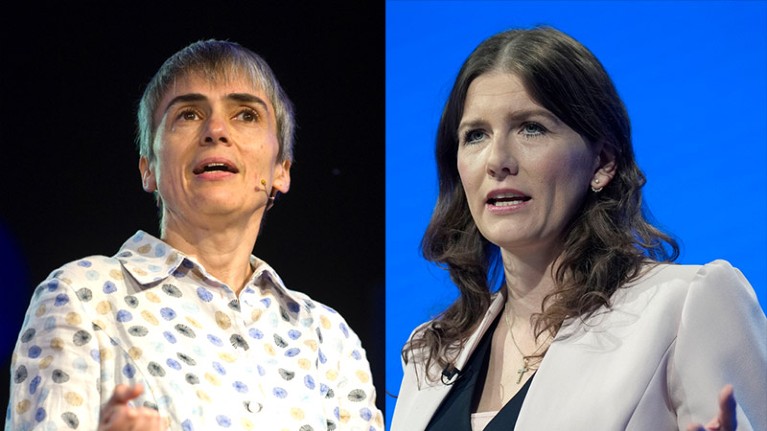UKRI chief executive Ottoline Leyser (left) suspended an advisory group at the funder, following a letter from UK science minister Michelle Donelan.Credit: Jeff Morgan/Alamy, Christopher Furlong/Getty
More than a dozen researchers have resigned from voluntary positions at the national funder UK Research and Innovation (UKRI), over a row in which the government demanded the dissolution of a newly formed UKRI equality, diversity and inclusion (EDI) advisory group.
On 31 October, UKRI’s chief executive, plant biologist Ottoline Leyser, suspended the EDI expert group at the request of UK science minister Michelle Donelan, who in a 28 October letter said she was “outraged” at “extremist” views on the Israel–Hamas conflict expressed by two EDI panel members on X, formerly Twitter.
The panel had been set up to help the UKRI body Research England to address EDI issues that affect research and funding allocation at universities. In her letter responding to Donelan, Leyser said that UKRI “will conduct a transparent and impartial investigation to identify any breach of the terms of appointment” to the EDI group.
UKRI’s move has drawn sharp criticism from researchers who say that the science minister’s demand to disband the group violates principles of academic freedom and freedom of speech.
Open letters
The social-media posts that Donelan criticized are no longer publicly available. In her letter, she condemned a post by one panel member who described the UK government’s plans to crack down on support for Hamas in the United Kingdom as “disturbing”. The UK government proscribes Hamas as a terrorist organization. Donelan denounced a post by a second researcher that described Israel’s actions as “genocide and apartheid”. (The two researchers named by Donelan did not respond to a Nature’s requests for comment.)
“UKRI have bowed to government pressure and sent out the message that anyone who disagrees with government policies is not welcome in their organization,” says Laura Kelly, a historian of modern Ireland at the University of Strathclyde in Glasgow, UK, who has resigned her voluntary position as a peer reviewer of UKRI funding proposals for interdisciplinary research because of the agency’s response. “This has worrying repercussions for academic freedom.”
Kelly is one of more than 3,300 academics who signed an open letter urging the funder to reject the minister’s request. The researchers argue that Donelan mischaracterized the panel members’ posts as extremist, and say that letter constitutes unacceptable political interference.
“These tweets were not in any way ‘extremist’,” says Kelly. “They just happened to be, rightly, in my view, going against the UK government’s stance on this issue.”
In a statement to Nature, Donelan’s ministry, the Department for Science, Innovation and Technology, said that Donelan “has been clear that academic freedom and free speech within the law are sacrosanct and this position has not changed”.
Matt Bennett, a philosopher at the University of Essex in Colchester, UK, who resigned from his role as a peer reviewer for a UKRI body, the Arts and Humanities Research Council, is disappointed that UKRI has not protected its members and defended the integrity of UK science. “They are very much complicit now in this attempt to interfere in academic freedom and freedom of speech. I will not volunteer my time to help an organization that does that.”
Agency response
In a statement to Nature, UKRI said: “We understand why some in our community feel the need to resign from UKRI advisory roles. We are grateful for their service and hope that relationships can be healed in the future. We are adopting a well-governed process to support evidenced, principled decisions.”
Tanja Bueltmann, a historian of migration and diaspora at the University of Strathclyde, also resigned from a voluntary role as a UKRI peer reviewer. “UKRI has shown that they do not, even at the most basic level of duty of care, have our back,” she says. “I think it would have been perfectly feasible to say something like, we care about the welfare of the people who work for us, but they did not mention this.”
By resigning, the researchers hope to put pressure on UKRI to reform the EDI advisory group. “UKRI should publicly apologize to the two academics targeted by Donelan and whose well-being and safety has been affected by all of this,” says Kelly. We also need to see a clearer articulation of UKRI’s independence from the government as a decision-making body.”
